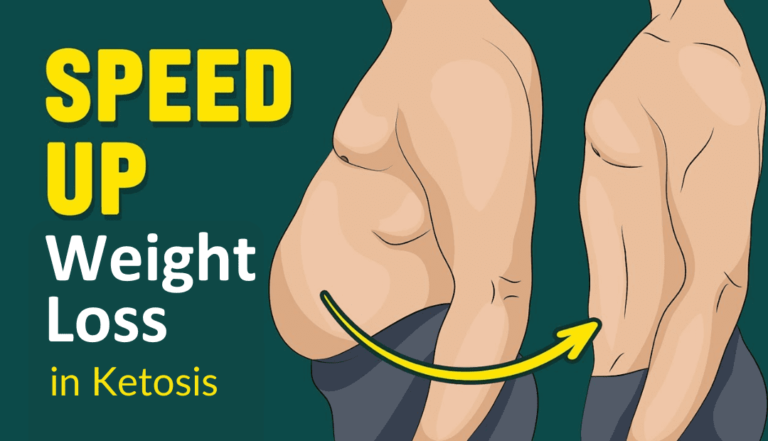Keto Diet for Athletes: Maximizing Performance and Recovery with Low-Carb Nutrition
The Keto Diet has gained popularity among athletes looking to improve their performance and endurance. By shifting your body’s primary energy source from carbohydrates to fats, you can potentially enhance energy levels and accelerate recovery. Many athletes are finding that with the right approach, this low-carb, high-fat diet can provide significant benefits during training and competitive events.

Adopting the Keto Diet is not just about cutting carbs; it requires a strategic plan tailored to your specific training needs. You’ll need to consider your macronutrient ratios and the timing of your food intake, particularly around your workouts, to ensure optimal performance. This diet does come with its own set of challenges, but understanding how to navigate them can make a big difference in achieving your athletic goals.
As you read on, you’ll discover practical tips on implementing the Keto Diet effectively, what to eat before and after workouts, and how to adjust your nutrition based on your training cycle. You’ll be equipped with the knowledge to adapt your diet for maximum benefit and overcome common hurdles.
Key Takeaways
- The Keto Diet shifts your body to burn fat for energy.
- Timing your meals is crucial for maximizing workout performance.
- Understanding the challenges of the Keto Diet helps in adapting effectively.
Fundamentals of the Keto Diet for Athletes

The ketogenic diet can play a significant role in enhancing athletic performance by shifting your body’s primary energy source. Key aspects include understanding ketosis, the benefits of endurance, and how to properly balance macronutrients.
Defining Ketosis for Performance
Ketosis is a metabolic state where your body burns fat for fuel instead of carbohydrates. When you significantly reduce your carb intake, your liver converts fatty acids into ketones. These ketones then serve as an efficient energy source during exercise. For athletes, reaching ketosis usually requires a strict low-carb diet for about two to four weeks. This adaptation period is crucial as it helps your body transition from using glucose to utilizing ketones. Maintaining ketosis can improve your stamina and reduce fatigue during extended workouts. By understanding ketosis, you can better manage your energy levels and enhance overall performance.
Benefits of Keto for Athletic Endurance
The keto diet offers multiple benefits for endurance athletes. One of the primary advantages is the ability to utilize fat as a stable energy source, which means you can save your limited glycogen reserves for high-intensity bursts. Athletes adapted to keto often report improved stamina during long training sessions. Research shows that using ketones can delay fatigue and help with recovery. Additionally, the diet may aid in reducing inflammation and supporting heart health, both important for athletes engaged in rigorous training. This unique fuel source allows for more sustained energy over longer periods without the quick crashes associated with high-carb diets.
Macronutrient Ratios for Athletes
To succeed on the keto diet, it’s essential to understand macronutrient ratios. A common distribution for athletes might include 70% fat, 20% protein, and 10% carbohydrates. This balance ensures you’re in ketosis while still getting the necessary nutrients for your performance. On training days, you may adjust these ratios slightly, perhaps aiming for 65% fat, 25% protein, and 15% carbohydrates. Most of your daily carbs should come after workouts to help with recovery. It’s also important to select healthy fats, such as avocados and nuts, to optimize your energy levels and support overall health. Properly managing these ratios can be the key to unlocking your athletic potential on the keto diet.
Implementing Keto in Athletic Training

Adopting a ketogenic diet in your training regime requires careful adjustments. You’ll focus on reducing carbohydrate intake while ensuring you meet your nutritional needs. Understanding how to manage your macronutrients and hydration effectively is key for maximizing performance.
Adapting to a Low-Carb Performance Diet
Transitioning to a low-carb, high-fat diet involves more than just changing what you eat. Start by gradually reducing your carb intake to ease the transition.
Aim for a daily intake of less than 50 grams of carbs. Focus on healthy fats like avocados, nuts, and olive oil. Protein should remain moderate to avoid excessive gluconeogenesis.
Monitor how your body responds to these changes. You may experience decreased energy initially, known as the “keto flu.” This phase typically lasts a week. After adaptation, many athletes report improved endurance.
Periodizing Carbohydrate Intake
Strategic carbohydrate intake can enhance your performance while on a ketogenic diet. Consider cycling your carbs about your training intensity and duration.
On days with high-intensity workouts, slightly increase your carb intake. Consuming around 20-30 grams of fast-digesting carbs post-workout can help replenish glycogen stores.
Use lower-carb days to promote fat adaptation. This approach allows your body to switch between burning fat and carbs more efficiently, improving your energy levels during different training phases.
Hydration and Electrolyte Management
Hydration is crucial when following a ketogenic diet. Lower carb intake can lead to a decrease in insulin levels, causing your kidneys to excrete more water and electrolytes.
Aim for increased fluid intake, targeting at least 3 liters per day. Include electrolyte-rich drinks to combat the loss of sodium, potassium, and magnesium.
Adding a pinch of salt to your meals can help maintain sodium levels. Consider supplements for potassium and magnesium if needed. Monitoring your hydration and electrolyte status will support peak performance and recovery.
Pre- and Post-Workout Nutrition Strategies
Nutrition is crucial for athletes on a keto diet, especially before and after workouts. Focusing on the right foods can enhance performance and recovery.
Optimizing Pre-Workout Meals
Before a workout, your body needs fuel that aligns with a ketogenic approach. Aim for meals high in healthy fats and moderate in protein. Avoid carbohydrates to maintain ketosis.
Key foods include:
- MCT Oil: Provides quick energy.
- Avocado: Rich in healthy fats.
- Eggs: Offer protein and essential nutrients.
Consume your pre-workout meal about 1 to 2 hours before exercise. This timing allows for digestion and energy availability.
Example Pre-Workout Meal:
- 2 scrambled eggs cooked in coconut oil
- 1/2 avocado on the side
This combination gives you sustained energy without spiking insulin levels.
Keto-Adapted Recovery Nutrition
After your workout, your body requires nutrients to recover and rebuild. On a keto diet, focus on replenishing energy with fats and proteins. Carbohydrates should remain minimal to support ketosis.
Suggested post-workout foods:
- Bone broth: Good for hydration and minerals.
- Beef jerky: Provides protein with low carbs.
- Coconut yogurt: Has healthy fats and probiotics.
Aim to eat within 30 minutes after exercising. This can help maximize recovery.
Example Post-Workout Meal:
- A smoothie with coconut milk, spinach, and protein powder
- A handful of nuts for added healthy fats
By prioritizing these nutritional strategies, you can effectively support your performance and recovery on a ketogenic diet.
Monitoring and Adapting to the Keto Diet
To achieve the best results on the keto diet, you need to monitor your progress and make adjustments based on your performance and training demands. This involves tracking various metrics and knowing when to tweak your carbohydrate intake to support your training.
Tracking Progress and Performance
Tracking your progress is essential for understanding how the keto diet affects your performance. Use a journal or an app to monitor key metrics such as:
- Body Weight: Record your weight weekly to see how it changes.
- Body Composition: Measure body fat percentage to assess fat loss.
- Performance Metrics: Track endurance, strength levels, and recovery times during your workouts.
Regularly review your data to identify trends. If you notice declines in performance or energy levels, consider recalibrating your approach to the diet. Aim for consistent monitoring, as this can help you stay on track and make informed decisions.
Adjusting the Diet for Training Demands
Your training schedule might necessitate changes in your dietary plan. For high-intensity workouts or competitions, you may need to adjust your fat and protein intake to provide adequate energy.
- Increase Protein: On days when you have tougher workouts, consume more protein to support muscle repair.
- Modify Fat Intake: You may need to increase healthy fats to ensure your energy levels are sustained.
Consider cycling your carbohydrate intake on intense training days to provide a boost in energy. Pay attention to how these changes affect your performance and recovery times.
When to Reintroduce Carbohydrates
You might find that incorporating carbohydrates at certain times can enhance your performance. This can be particularly useful during prolonged activities or competitions.
- Strategic Carb Loading: Before an event, consider increasing carbohydrate intake 1-2 days before optimizing glycogen stores.
- Post-Workout Nutrition: After intense training, a small amount of carbohydrates can aid recovery.
Listen to your body and assess how reintroducing carbohydrates impacts your overall performance and energy levels. It’s essential to find the right balance that works specifically for you.
Common Challenges and Solutions
Athletes following a keto diet often face specific challenges. Understanding these can help you find effective solutions to maintain your performance and health.
Overcoming Energy Deficits
When switching to a keto diet, you may experience energy deficits, especially during high-intensity workouts. As your body adapts to utilizing fat for fuel, it might not provide the immediate energy you’re used to from carbohydrates.
To combat this, ensure you’re consuming enough calories, particularly from healthy fats. Incorporate foods like avocados, nuts, and coconut oil to boost your caloric intake.
Keep track of your macronutrients. Aim for a balance of around 70% fats, 25% protein, and 5% carbohydrates. Gradually increase your fat intake to support your energy needs during training.
Dealing with Keto Flu in Athletes
Keto flu can occur when you first start the diet. Symptoms such as fatigue, headaches, and irritability may arise as your body adapts.
To ease these symptoms, stay hydrated. Drink plenty of water and consider adding electrolyte-rich foods like spinach, and almonds to your meals to maintain mineral levels.
Additionally, consuming bone broth can help replenish the electrolytes lost during this transition. Be patient, as these symptoms typically subside within a week as your body adjusts to ketosis.
Dining Out and Travel Tips
Eating out while on a keto diet can be challenging, but it is manageable with some preparation.
Before dining out, look up the menu online. Focus on protein dishes, such as grilled meats or fish, and ask for extra vegetables instead of starches.
When traveling, pack snacks like cheese, beef jerky, or keto bars to avoid non-keto options on the go. Research local grocery stores; you can often find fresh produce and keto-friendly options.
Don’t hesitate to ask for modifications when ordering. Most restaurants are willing to accommodate dietary needs, making it easier for you to stick to your plan.
FAQS About Keto Diet for Athletes
Many athletes have questions about the ketogenic diet and its effects on performance. This section addresses common concerns and offers insights on how a keto diet can influence various aspects of athletic training and competition.
What are the pros and cons of a ketogenic diet for competitive athletes?
One major pro of a ketogenic diet is its potential to increase fat oxidation, fueling the body more efficiently during endurance events. You may experience improved energy levels due to a more stable blood sugar concentration.
However, cons include possible initial fatigue during the adaptation phase and a decrease in explosive power for sports requiring quick bursts of energy. It’s crucial to assess how your body reacts during training.
How does a keto diet impact endurance and performance in long-distance runners?
For long-distance runners, a ketogenic diet can enhance endurance by shifting the body’s primary fuel source from carbohydrates to fats. You may find that this allows for more efficient use of stored energy during prolonged activities.
Some studies suggest that well-adapted athletes report improved stamina and less reliance on sugary gels or drinks during races. This might lead to fewer spikes and crashes in energy levels during long runs.
Can a ketogenic diet be beneficial for high-intensity training and muscle recovery?
While ketogenic diets can benefit endurance, their effects on high-intensity training are less clear. You might experience challenges during short, explosive efforts since glycogen stores are lower.
For muscle recovery, some athletes find that a high-fat diet can help reduce inflammation. Including adequate protein can also support muscle repair after intense workouts.
Are there Olympic athletes who successfully follow a ketogenic diet regime?
Yes, some Olympic athletes have successfully adopted a ketogenic diet. These athletes often find that it helps with body composition and endurance.
Examples include cyclists and long-distance runners who benefit from improved fat metabolism. You can often find cases of athletes sharing their positive experiences in competitive settings.
How does transitioning to a keto diet affect gym performance and strength training?
Transitioning to a ketogenic diet may initially affect gym performance, especially in strength training. You might notice a decrease in strength as your body adapts from using carbs to fats for energy.
Once fully adapted, some athletes report regaining strength and improved endurance. Pay attention to how your performance changes over time.
What nutritional considerations should athletes take into account when adopting a keto diet for optimal performance?
When adopting a keto diet, you should focus on quality fats, sufficient protein, and low-carb vegetables. Monitoring your electrolyte intake is also important to prevent imbalances.
Consider meal timing as well, especially around workouts. This can help you maintain energy levels during training and recovery sessions while adhering to your dietary plan.






